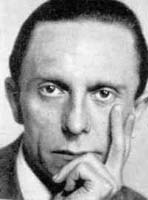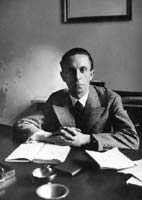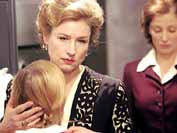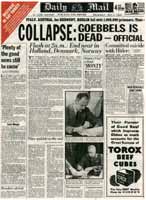Joseph
Goebbels was born into a strict Catholic, working-class
family from Rheydt in the Rhineland on 29 October
1897. He was educated at a Roman Catholic school and
went on to study history and literature at the University
of Heidelberg under Professor Friedrich Gundolf, a
Jewish literary historian renowned as a Goethe scholar.
Goebbels had been rejected for military service during
World War I because of a crippled foot - the result
of contracting polio as a child. He joined the NSDAP
(Die Nationalsozialistische Deutsche Arbeiterpartei)
in 1922.
 ...... ...... |
At
first Goebbels's hyperactive imagination found an
outlet in poetry, drama and a bohemian life-style,
but apart from his expressionist novel, Michael: ein
Deutsches Schicksal in Tagebuchblattern (1926), nothing
came of these first literary efforts. It was in the
Nazi Party that Goebbels's sharp, clear-sighted intelligence,
his oratorical gifts and flair for theatrical effects,
his uninhibited opportunism and ideological radicalism
blossomed in the service of an insatiable will-to-power.
Goebbels
founded and edited the Nationalsozialistischen Briefe
(NS Letters) and other publications of the Strasser
brothers, sharing their proletarian anti-capitalist
outlook and call for a radical reevaluation of all
values. His National Bolshevik tendencies found expression
in his evaluation of Soviet Russia (which he regarded
as both nationalist and socialist) as 'Germany's natural
ally against the devilish temptations and corruption
of the West'.
It
was at this time that Goebbels, who had co-authored
the draft programme submitted by the Nazi Left at
the Hanover Conference of 1926, called for the expulsion
of 'petty-bourgeois Adolf Hitler from the National
Socialist Party'. Goebbels's shrewd political instinct
and his opportunism were demonstrated by his switch
to Hitler's side in 1926, which was rewarded by his
appointment in November of the same year as Nazi district
leader for Berlin- Brandenburg.
By 1927 he had already become the most feared demagogue
of the capital city, fully exploiting his deep and
powerful voice, rhetorical fervour and unscrupulous
appeal to primitive instincts. Goebbels knew how to
mobilize the fears of the unemployed masses as the
Great Depression hit Germany, playing on the national
psyche with 'ice-cold calculation'.
Hitler
was deeply impressed by Goebbels's success in turning
the small Berlin section of the Party into a powerful
organization in North Germany and in 1929 appointed
him Reich Propaganda Leader of the NSDAP. Goebbels
found his mission in selling Hitler to the German
public, in projecting himself as his most faithful
shield-bearer and orchestrating a pseudo-religious
cult of the Fuhrer as the saviour of Germany.
He
played a crucial role in bringing Hitler to the centre
of the political stage in the election campaigns of
1932. He was rewarded on 13 March 1933 with the position
of Reich Minister for Public Enlightenment and Propaganda,
which gave him total control of the communications
media - i.e. radio, press, publishing, cinema and
the other arts.
For
five years Goebbels chafed at the leash as the Nazi
regime sought to consolidate itself and win international
recognition. His opportunity came with the Crystal
Night pogrom of 9-10 November 1938, which he orchestrated
after kindling the flame with a rabble-rousing speech
to Party leaders assembled in the Munich Altes Rathaus
(Old Town Hall) for the annual celebration of the
Beer- Hall putsch. Later, Goebbels was one of the
chief secret abettors of the 'Final Solution', personally
supervising the deportation of Jews from Berlin in
1942.
During
World War II relations between Hitler and Goebbels
became more intimate, especially as the war situation
deteriorated and the Minister of Propaganda encouraged
the German people to ever greater efforts. In a famous
speech on 18 February 1943 in the Berlin Sportpalast,
Goebbels created an atmosphere of wild emotion, winning
the agreement of his listeners to mobilization for
total war. As
the war neared its end, Goebbels, the supreme opportunist,
emerged as the Fuhrer's most loyal follower, spending
his last days together with his family, in the Fuhrerbunker
under the Chancellery. Convinced that the Nazis had
finally burnt all their bridges and increasingly fascinated
by the prospect of a final apocalypse, Goebbels's
last words on dismissing his associates were: 'When
we depart, let the earth tremble!'
He
had his six children poisoned with a lethal injection
by an SS doctor and then himself and his wife Magda
shot by an SS orderly on 1 May 1945. He declared not
long before his death: 'We shall go down in history
as the greatest statesmen of all time, or as the greatest
criminals.'
 ...... ......
Joseph
Goebbels with wife Magda and three out
of six kids |
|
Scene
with
Magda Goebbels - "Downfall"
movie (Der Untergang) |

Daily
Mail two days after Goebbels' suicide
ckick the image for
readable version
Some
of the Goebbels' principles of propaganda:
"Propaganda must be planned and executed
by only one authority."
"Credibility alone must determine whether
propaganda output should be true or false."
"Propaganda must label events and people
with distinctive phrases or slogans. "
"Propaganda must facilitate the displacement
of aggression by specifying the targets for
hatred. "
"Black rather than white propaganda may
be employed when the latter is less credible
or produces undesirable effects. "
"To be perceived, propaganda must evoke
the interest of an audience and must be transmitted
through an attention-getting communications
medium. "
"Propaganda to the home front must create
an optimum anxiety level"
Quotes
"If
you tell a lie big enough and keep repeating
it, people will eventually come to believe
it." and "The bigger the lie, the
more it will be believed." are widely
and incorrectly attributed to Goebbels. It
is probable that these are the paraphrases
of the Goebbels' text "Churchill's Lie
Factory" where he said: "The English
follow the principle that when one lies, one
should lie big, and stick to it. They keep
up their lies, even at the risk of looking
ridiculous." - Jospeh Goebbels, "Aus
Churchills Lügenfabrik," 12. january
1941, Die Zeit ohne Beispiel
|
|